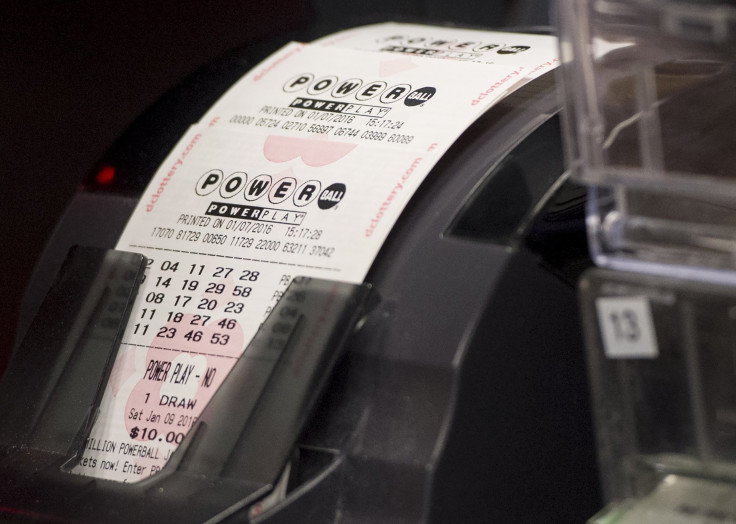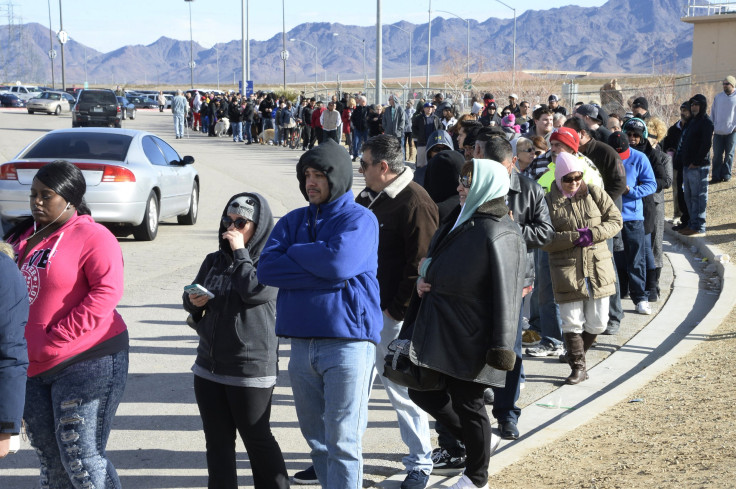Amid Record Powerball Jackpot, Does Lottery Target The Poor? Low-Income Households Buy Lotto Tickets At High Rates

The record Powerball jackpot has spawned a critical mass mania, but it's also attracted the attention of certain advocacy groups who say the lottery overall preys on the poor. While the Powerball's estimated $1.5 billion grand prize is enticing regardless of one’s financial standing, it’s the fact that Americans with the lowest socioeconomic status routinely outspend the rest of their fellow citizens by hundreds of millions of dollars on lotto tickets annually that has watchdog groups concerned.
“The strongest ethical challenge to the lottery came down to the question of promoting this form of gambling that did not seem to be an appropriate role for the state government,” said Phillip J. Cook, a professor of public policy at Duke University in Durham, North Carolina.
Even before the height of lotto fever, debates advanced over the ethics of state lotteries' marketing tactics, with state investigations being launched into whether lotteries essentially profit off despair.

Cook, who co-authored the book “Selling Hope: State Lotteries in America,” said the trend of poorer communities spending more money per capita on lottery tickets stretches across the country. “Obviously, that issue is particularly assailant when it comes to people with low incomes,” he said.
The cost of a Powerball ticket is just $2, but it is the elusive return on that investment that has Cook concerned low-income gamblers are being sold largely hollow dreams. His research found that nationally, households in low tax brackets -- those earning below $25,000 -- put a considerable strain on their extra spending money by dishing out an annual average of nearly $600 on lottery tickets. Conversely, those who earned more than $100,000 spent only $289 per year.
While people are free to use their money however they see fit, the investigation also found the higher one's education level, the less he or she spends on lottery tickets. College dropouts averaged $700 a year on lottery tickets, while those with degrees spent $178. But the odds are stacked against the typical Powerball player, who has a 1 in 292 million chance of winning, leaving those lowest on the financial totem pole lopsidedly with emptier pockets.
“There was a clear indication that people in the lowest income group spend their income at higher rates,” Cook said.
State-specific studies over the years have come to the same conclusions. In Maine, residents on public assistance have hit various lottery jackpots to the tune of more than $22 million in winnings since 2010, according to a report published last year commissioned by the Maine Center for Public Interest Reporting. The winners received aid from at least one of the state’s three programs, including food stamps, aid for needy families and Medicaid.
“For many, it is a last resort when in a desperate state of getting themselves out of the situation they are in,” said David Sherwood, who wrote the report. “We got the sense that hopelessness … was what drove them.”
Residents in the state’s poorest communities spent up to 200 times more per person than those in wealthier counties, according to the report. The findings prompted a strong response from Maine lawmakers. The legislature unanimously voted Friday to expand a review of the state’s lottery by the Office of Program Evaluation and Government Accountability that was already underway to include assessing the impact the program has on low-income populations.
“The study certainly raises a lot of concern,” said Democratic Maine Sen. Chris Johnson. “If that proves to be accurate, then what it is saying is that we are balancing the budget by making victims out of some of the most financially vulnerable communities in the state, and that is morally wrong.”
Some Maine lawmakers recently proposed making it illegal for recipients of public assistance to purchase lottery tickets, but it is not clear how such a ban would be enforced. Depending on the findings, Johnson said he would be open to eliminating the lottery program altogether. His response would be “based on the merits of the lottery in and of itself as a practice that we are marketing in the state of Maine and whether that should continue,” he said.
There have been efforts in at least one other state to ban people on welfare from participating in the lottery. North Carolina drafted a bill in 2013 to reprimand vendors for selling tickets to people they know are on welfare, but the legislation never came to fruition.
Other states have moved to pass legislation that concern both the lottery and those on public assistance, but these laws are in the interest of the state budget. New Yorkers who win more than $600 in the lottery are required to use a portion of their winnings to repay any benefits received in the last decade. In Michigan, one woman’s tale of hitting the jackpot made headlines in 2012 for reasons other than her astounding luck when it was found that she continued to accept food assistance from the government. The case prompted a 2012 law that required state officials to begin reviewing the list of winners for public assistance recipients.
Some advocacy groups see fault in the states' advertising campaigns, which they say are particularly attractive to people who are seeking a way out of poverty.
“Having to concentrate that much time to make ends meet, it starts to skew your vision of how money will change your situation,” said David Just, a behavioral economist professor at Cornell University, who authored the Maine Center for Public Interest Reporting study, adding: “I don’t think [state lotteries] are sitting around a table to specifically target them. They are looking at where their advertisements have worked and which ones have worked well.”
Lottery advertising was banned until 1975 by the federal government, but it has since become a constant and widespread presence in the marketing field. In essence, advertising serves to turn a new or occasional user into a more frequent consumer. When it comes to what some say is a vice, the ethics of this promotion become more complicated, especially when state governments are the ones behind the advertisements.
In Michigan, for example, the state lottery board acknowledges the pitfalls of the game. “If you bet more than you can afford to lose, you may have a problem. You can contact us anytime for help,” its website advises.
State lotteries argue that the benefits it can provide outweigh any downfalls that pressing one’s luck may present. Jeff Holyfield, director of public relations at the Michigan Lottery, notes the lottery revenue supports education and benefits not only the 11,000 retailers that sell tickets but also those playing to win.
“We’re in the entertainment business,” Holyfield said. “Our games are designed to be fun and entertaining for players, and excitement comes from winning money.
Without the lottery, Holyfield said, there would be around $800 million less going to to the state’s public education. “You’ve got people lined up around the country. You don’t see people lining up to pay their taxes,” he added.
© Copyright IBTimes 2024. All rights reserved.






















